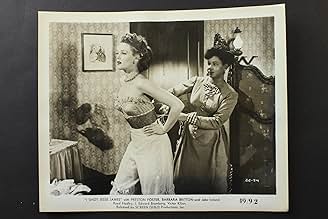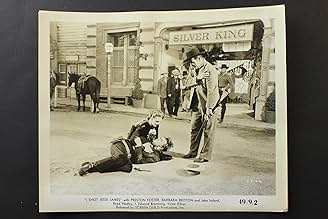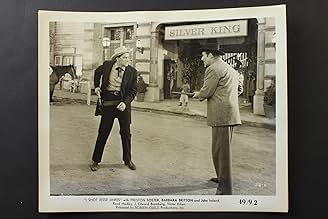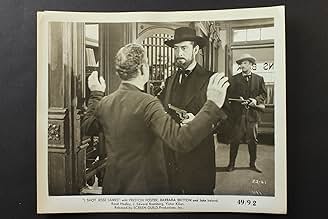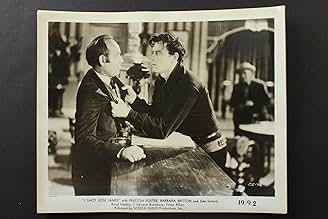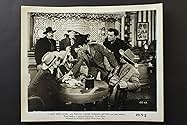VALUTAZIONE IMDb
6,8/10
2656
LA TUA VALUTAZIONE
Aggiungi una trama nella tua linguaBob Ford murders his best friend Jesse James in order to obtain a pardon that will free him to marry his girlfriend but is plagued by guilt and self-disgust.Bob Ford murders his best friend Jesse James in order to obtain a pardon that will free him to marry his girlfriend but is plagued by guilt and self-disgust.Bob Ford murders his best friend Jesse James in order to obtain a pardon that will free him to marry his girlfriend but is plagued by guilt and self-disgust.
- Regia
- Sceneggiatura
- Star
Tommy Noonan
- Charles Ford
- (as Tom Noonan)
Barbara Wooddell
- Mrs. Zee James
- (as Barbara Woodell)
Phillip Pine
- Man in Saloon
- (as Phil Pine)
Victor Adamson
- Townsman
- (non citato nei titoli originali)
Fred Aldrich
- Townsman
- (non citato nei titoli originali)
Phil Bloom
- Townsman
- (non citato nei titoli originali)
Recensioni in evidenza
Sam Fuller's first film direction is a version of what happened to Robert Ford (John Ireland), the man who famously killed his friend - Jesse James (Reed Hadley).
Taking up the basic elements of the real life story, Fuller keeps the narrative tight whilst ensuring the complexities of the main characters come to the fore. All the quirks and peccadilloes of the human condition are explored (the detail of Ford's torments and troubles superbly told), which is something of a rarity for a late 1940s "B" standard Western. The use of close-ups are to purposely highlight the psychological discord on show, marking this out as a good pointer to the later work of its maverick director. Ernest Hiller photographs the exteriors out of Iverson Ranch in Chatsworth and support to Ireland comes from Preston Foster, Barbara Britton and J. Edward Bromberg. 7/10
Taking up the basic elements of the real life story, Fuller keeps the narrative tight whilst ensuring the complexities of the main characters come to the fore. All the quirks and peccadilloes of the human condition are explored (the detail of Ford's torments and troubles superbly told), which is something of a rarity for a late 1940s "B" standard Western. The use of close-ups are to purposely highlight the psychological discord on show, marking this out as a good pointer to the later work of its maverick director. Ernest Hiller photographs the exteriors out of Iverson Ranch in Chatsworth and support to Ireland comes from Preston Foster, Barbara Britton and J. Edward Bromberg. 7/10
it reminds the Biblical stories. or damned characters of Dostoievski.in fact, it is an inspired western, proposing a hero, a coward mate and the fall of dreams, a show as remind of guilt and the public contempt. a film who did not demonstrate anything. only gives a large picture about gestures and fragile and obscure border between bad and good. and this transforms "I Shot Jesse James" more than a B western but a demonstration about values and expectations and illusion and friendship. the noble Jesse James and the knavish Ford. a story with moral veil who remains nice demonstration about limits and falls.
I think this movie is more about Robert Ford than say Jesse James. John Ireland does a great job as the cowardly Bob Ford.. the James gang just having finished another robbery is on the run hiding out somewhere in Missouri,, Jesse is living under an alias. One thing that this movie presented to me was that the James' somehow are related to the Younger's and the Dalton's interesting fact if its' true. With that price of 10,000 on Jesse's head it becomes almost impossible for Bob Ford to resist it,, he plans on getting a house in the country and marrying his sweetheart Cynthy,, so he figures to cash in on his friend Jesse's head dead or alive,, what he doesn't count on is 2 things,, first being the public outcry of Jesse's death,, also the shrinking of the reward money,, and secondly how Cynthy would react,, he figures she'd be happy so that they could get married and so on.. wrong ,,, she has a conscious, and starts to despise Bob,, and at best pity him. this is a pretty good telling of the story of Jesse getting shot by Bob.
It's one of the oldest Western stories: Jesse James was a big-time outlaw, robbing banks left and right, alongside his gang, including Robert Ford. One day, upon hearing of the huge bounty (and possibility of amnesty for anyone in the gang) for Jesse's murder, Ford took it upon himself to kill him so that he could be free and clear to mary his would-be wife. But things didn't quite turn out right afterwords, and Ford was considered more-so a coward, a traitor for doing this act, and any gunslinger who could gun Ford down would then be seen as the baddest dude in the west. At least, that's the legend anyway that comes out of the main plot. But there's more to it, at least under the surface, that Samuel Fuller gets to in his take on the legend of one man's existential downfall from killing his best friend, who happened to be the most feared- and yet most admired- bank robber in America for a short while. Fuller might be asking why he was admired, when he didn't do anything that really merited praise only in hindsight. There's a sense of pure melodrama, brimming with acting that is typical for the budget, but somehow Fuller brings out the best in what might be a little limited in the character actors.
John Ireland says a lot in the understated expressions on his face, the tense feeling of rejection from the only one he can get close to- once Jesse is out of the picture- and likewise Cynthy (Barbara Britton) is very good at doing the 'acting-concerned' woman that is reluctant to be on Ford's sleeve. It's all the more compelling because Fuller could easily make the direction more into a black and white category, that Ford is bad like Jesse was, and Cynthy is more than in her reasoning for not wanting to marry him. But even in the pulpy world of Jesse James and Robert Ford, there is room for compromise. I liked seeing the scenes where Ford goes through the humiliating act of doing a theater re-enactment of the killing scene, but suddenly seeing in a vision the actual act he performed superimposed over the pantomime. And, immediately after, as one of the very best scenes in the film, a traveling singer who sings a song terrified in Ford's face about how much of a traitor he was for killing such a man like Jesse James.
It's a sharp script considering what Fuller would have to work with, but it's also the simplicity of his craft (it might be one of those genre films where the style is so stripped down to bare essentials with necessary close-ups, consistent medium shots, that when something 'stylistic' happens like in the last shootout between Kelly and Ford that it is shocking), how Fuller pushes it into looking like a tale that on the surface as a conventional feature. But watch how the suddenness of violence sparks up interest in the craft, how the opening bank robbery is timed and shot with the same level- or even more- tension than your average heist thriller. Or in the actual infamous scene itself, which is preceded by Ford getting a chance beforehand when James was in the bath, and the cut-aways to the POV at the back. It's bold-faced type through a crisp full-frame lens.
And while Fuller would still go on to make greater films, I Shot Jesse James is a fantastic prototype for a great career, where history merges with the human process of change, and how love, however a typical thing in a triangle situation, complicates even the strongest of men.
John Ireland says a lot in the understated expressions on his face, the tense feeling of rejection from the only one he can get close to- once Jesse is out of the picture- and likewise Cynthy (Barbara Britton) is very good at doing the 'acting-concerned' woman that is reluctant to be on Ford's sleeve. It's all the more compelling because Fuller could easily make the direction more into a black and white category, that Ford is bad like Jesse was, and Cynthy is more than in her reasoning for not wanting to marry him. But even in the pulpy world of Jesse James and Robert Ford, there is room for compromise. I liked seeing the scenes where Ford goes through the humiliating act of doing a theater re-enactment of the killing scene, but suddenly seeing in a vision the actual act he performed superimposed over the pantomime. And, immediately after, as one of the very best scenes in the film, a traveling singer who sings a song terrified in Ford's face about how much of a traitor he was for killing such a man like Jesse James.
It's a sharp script considering what Fuller would have to work with, but it's also the simplicity of his craft (it might be one of those genre films where the style is so stripped down to bare essentials with necessary close-ups, consistent medium shots, that when something 'stylistic' happens like in the last shootout between Kelly and Ford that it is shocking), how Fuller pushes it into looking like a tale that on the surface as a conventional feature. But watch how the suddenness of violence sparks up interest in the craft, how the opening bank robbery is timed and shot with the same level- or even more- tension than your average heist thriller. Or in the actual infamous scene itself, which is preceded by Ford getting a chance beforehand when James was in the bath, and the cut-aways to the POV at the back. It's bold-faced type through a crisp full-frame lens.
And while Fuller would still go on to make greater films, I Shot Jesse James is a fantastic prototype for a great career, where history merges with the human process of change, and how love, however a typical thing in a triangle situation, complicates even the strongest of men.
Sam Fuller's directorial debut is more of a character study than a traditional western. John Ireland stars as Bob Ford, who kills his friend Jesse James in order to get immunity for his past crimes so that he can settle down with the girl he loves. Wracked with guilt and feelings of inadequacy, Ford pursues the girl in the face of a rival for her heart. Fuller hasn't fully developed his dynamic style yet, in fact, this feels more like a low budget Nicholas Ray film than a Fuller film. A scene where Ford forces a dude to sing the ENTIRE song about Jesse James being killed by "that coward Robert Ford" is priceless and worth the price of admission.
Lo sapevi?
- QuizDirector Samuel Fuller said that he wanted to make this picture because, unlike many filmmakers in Hollywood, he did not see the real Jesse James as a folk hero or someone to be admired. Fuller saw him as a cold-blooded psychopath who shot down women, children, the elderly, the helpless (his gang once stopped a Union hospital train and executed every wounded federal soldier on it) and, in Fuller's words, Bob Ford "did something that should have been done quite a bit earlier in the life of Jesse Woodson James".
- BlooperWhen Jesse's wife serves bread at dinner, the bread presented has obviously been sliced by a modern bread-slicing machine. Bread-slicing machines were not introduced until 1928.
- Citazioni
Bob Ford: Whatta yuh got to eat?
Joe, Silver King Bartender: Sweet corn, cornmeal mush, cornpone with cracklins, and corn whiskey.
Bob Ford: I'll have it.
- Curiosità sui creditiOpening credits are shown as posters hanging on a wall.
- ConnessioniFeatured in Gunfighters of the Old West (1992)
I più visti
Accedi per valutare e creare un elenco di titoli salvati per ottenere consigli personalizzati
- How long is I Shot Jesse James?Powered by Alexa
Dettagli
- Tempo di esecuzione
- 1h 21min(81 min)
- Colore
- Proporzioni
- 1.37 : 1
Contribuisci a questa pagina
Suggerisci una modifica o aggiungi i contenuti mancanti

